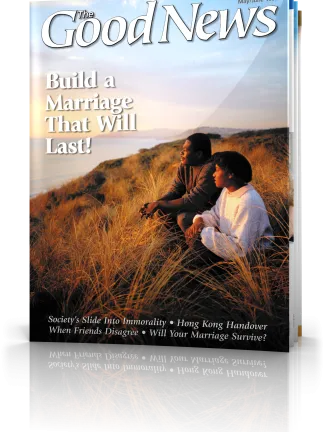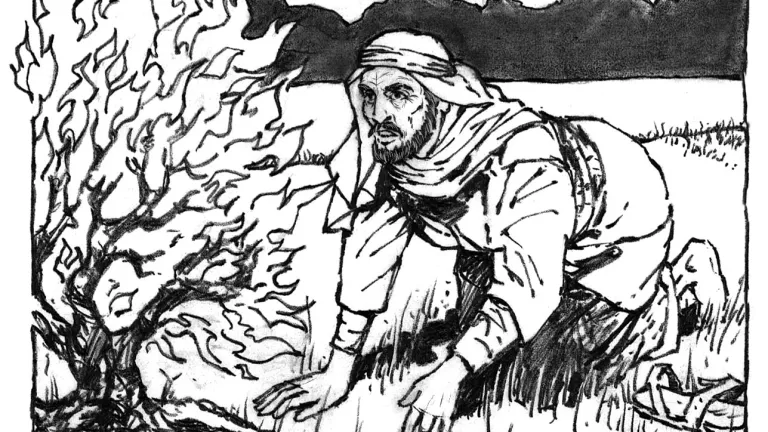Profiles of Faith: Miriam - A Lifetime of Faith

Although God inspired Moses to identify Miriam as a prophetess while she lived, she was still highly regarded in Scripture some 700 years after she died.
With cautious optimism and hope, Miriam crouched on the bank of the Nile River, watching intently as her baby brother Moses, lying in a waterproofed basket, floated among the reeds at river's edge.
She was anxious, and with good reason. Her mother, whom she loved and trusted, had instructed her to place the baby in this vulnerable position. Their hope was to save the infant, for the leader of mighty Egypt had just decreed that all Israelite baby boys be thrown in the river to drown.
Moses, the author of the book of Exodus, identified his older sister as a prophetess, the first recorded in the Bible.
Miriam and her mother knew that Pharaoh's daughter, accompanied by her maidens, came to the river to bathe. Will she come to the river today? she thought.
Miriam, the 7-year-old sister of Moses, realized that what she was doing was risky, because the tiny basket might break free from the protection of the reeds and get swept away in the river's forceful current . If caught, she might die herself for defying the ruler's order.
Then she heard muffled voices nearby. Women were walking toward the river, talking and laughing as they approached. One of them, Pharaoh's daughter, noticed the basket among the reeds.
Miriam's heart raced as the princess directed an assistant to retrieve the little ark and brought the baby boy to her. When the child began to cry, her heart was overwhelmed with compassion. She recognized him as a Hebrew child. It was at that moment that Miriam spontaneously hurried to the princess and offered to help. "I know of a Hebrew woman who could take care of this baby for you. Would you like her to nurse and care for him?"
The princess replied that she would, and Miriam rushed away to reunite her mother with her infant brother.
This rest is history, the remarkable story of a young girl, the older sister of Moses, who became a prophetess of God. Little could she imagine that some 80 years later, she and her sister Israelites would joyously proclaim their freedom from years of Egyptian bondage as she led them in praising God for His deliverance.
Life in Miriam's day
Let's get a glimpse of the setting, the backdrop of Miriam's day. Seven years Moses' senior, Miriam grew up a slave, the daughter of slaves. Assuming Moses was born around 1520 B.C. (Merrill Unger, Unger's Bible Dictionary, Moody Press, Chicago, 1988, p. 886), then Miriam was born around 1527.
Some 160 years earlier, a Hebrew family had fled drought in their homeland and arrived in Egypt as refugees. The patriarch of the family was Jacob, also named Israel. His estranged son Joseph had become chief assistant to the Pharaoh of that time. Under these circumstances the Hebrews were well treated and prospered as shepherds in the Nile delta. After the death of Israel and subsequently his son Joseph, "there arose a new king over Egypt, who did not know Joseph" (Exodus 1:8).
Recognizing how prolifically the Israelites had multiplied, this ruler began to fear the loss of Egyptian control of his own country. He knew too that the Israelites could ally with an enemy against the Egyptians. In an attempt to curb the Hebrew slaves, he pressed them into labor on major construction projects.
For years the Israelites toiled away in service to the Egyptians. But, in spite of the backbreaking work, the Hebrews continued to multiply—so much so that, by Miriam's day the Pharaoh took the drastic step of decreeing that all newborn Hebrew boys be thrown into the Nile to drown.
It's at this juncture that we find Miriam risking her life to save her little brother. Undoubtedly as Miriam lived and worked under this tyrant she learned lessons of faith in preparation for her role in the dramatic events that lay ahead for the children of Israel.
Faithful from childhood
Miriam helped save Moses from a sure death. She courageously defied the Egyptian ruler by placing Moses among the reeds by the river's edge (Exodus 2:3). Knowing she could face death for her actions, she cautiously watched over him. Waiting for the Egyptian princess, she seized the opportunity when it presented itself.
The princess could easily have rejected Miriam's offer of Moses' own mother to nurse the infant. But, in fulfilling God's plan for Moses, the Egyptian princess welcomed Miriam's suggestion.
In all this Miriam showed faithfulness, loyalty and poise. Such character would have been commendable if she had been in her 20 or 30s. But she was only 7. Her courage in such trying times, when Hebrew babies were being slaughtered for merely being boys, gives us a glimpse into the kind of woman she was to become. Little wonder she is referred to in Scripture as a faithful servant and prophetess of God!
Accounts of loyalty and faithfulness like Miriam's were recorded for our sake (Romans 15:4). Her godly characteristics were much in evidence at the moment of Israel's triumph, on the other shore of the Red Sea. After Israel was delivered from the jaws of death through the parting and closing of the Red Sea, Miriam took her timbrel and, following Moses' own song, led the women of Israel in musical praise of God for His deliverance (Exodus 15:20-21). It is in the recording of this incident that Moses, the author of the book of Exodus, identified his older sister as a prophetess, the first recorded in the Bible.
Although the Bible shows Miriam did not hold a position equal to that of Moses, she seems to have been viewed as a near equal to Aaron in importance. Exodus 15:20 refers to her as "Miriam the prophetess, the sister of Aaron." In other scriptures she is mentioned along with Moses, the nation's leader, and Aaron, its high priest. Although her exact position isn't known, she was clearly held in high regard by Moses, Aaron and her people.
Scripture gives no indication that Miriam ever lost her attitude of loyalty and faithfulness. However, God in His Word records not only the strengths of His faithful servants, but their flaws, including their errors in judgment. One of Miriam's actions—specifically her criticism of Moses' marriage to a woman of whom she disapproved—disclosed what seems to have been hidden resentment. God inspired Moses himself to record the details of her error, which was a serious issue to God.
Envy and excuse
Numbers 12:1 sets the scene for Miriam's open judgment of Moses: "Then Miriam and Aaron spoke against Moses because of the Ethiopian woman whom he had married; for he had married an Ethiopian woman. So they said, 'Has the Lord indeed spoken only through Moses? Has He not spoken through us also?' And the Lord heard it. (Now the man Moses was very humble, more than all men who were on the face of the earth.) Suddenly the Lord said to Moses, Aaron, and Miriam, 'Come out, you three, to the tabernacle of meeting!' So the three came out. Then the Lord came down in the pillar of cloud and stood in the door of the tabernacle, and called Aaron and Miriam. And they both went forward" (Numbers 12:1-5).
"Then He said, 'Hear now My words: If there is a prophet among you, I the Lord, make Myself known to him in a vision, and I speak to him in a dream. Not so with My servant Moses; he is faithful in all My house. I speak with him face to face, even plainly, and not in dark sayings; and he sees the form of the Lord. Why then were you not afraid to speak against My servant Moses?' So the anger of the Lord was aroused against them, and He departed" (Numbers 12:5-9, emphasis added throughout).
Miriam and Aaron (who was also older than Moses; Exodus 7:7) apparently chafed at Moses' preeminent calling and position. Since her name is mentioned first in their speaking against Moses (Numbers 12:1), perhaps Miriam initiated the criticism.
Their indignation over Moses taking a wife outside of Israel provided them the protection and credibility they sought—or so they thought. Miriam was searching for greater credibility; instead, she received the curse of leprosy. She and Aaron failed to acknowledge that it is God who sets up and removes leaders (Daniel 2:21).
God does not take rebellion lightly, especially when it comes from among His people and is directed against His authority. "So the anger of the Lord was aroused against them, and He departed. And when the cloud departed from above the tabernacle, suddenly Miriam became leprous, as white as snow . . ." (Numbers 12:9-10).
Since indications are that she had been the instigator of this criticism leveled at Moses, she apparently was the one singled out for punishment.
Living a lie is bad enough. Teaching wrong ways to God's people is worse. For example, Jeremiah warned the prophet Hananiah: "This year you shall die, because you have taught rebellion against the Lord' " (Jeremiah 28:16). In that case, as with Miriam, God acted decisively against attempts to rebel against Him.
God's anger and forgiveness
God's anger was swift but not capricious. Consider this event's significance against the backdrop of some incredible miracles: God heard Israel's cries for deliverance. He remembered His promise to Abraham, and He delivered the Israelites from Egyptian bondage (Exodus 3:7-9). He granted them freedom to worship and obey Him. God performed mighty miracles to free Israel: After the 10 plagues He poured on Egypt, He opened the Red Sea and allowed His people to escape over the dry sea bed. When Pharaoh's armies attempted to follow Israel, God dramatically buried them under tons of water.
Later, God fed, clothed and protected the Israelites during their wilderness travels for 40 long years, mercifully tolerating their human weaknesses. A careful study of those events can help us better understand Israel's trying nature and God's patient mercy for His people.
When Miriam set her hand against Moses, God reacted with justifiable anger. If her rebellious spirit were allowed to spread, rebellious attitudes and actions could affect others among the Israelites, they who were chosen to be a model nation to countries around them (Deuteronomy 4:5-8; 2 Samuel 7:23-24). God immediately inflicted Miriam with the dread disease of leprosy. Miriam was recognized as cursed, rebellious to God. She was exiled for a while from the Israelites' wilderness camp, a fate worse than death for some.
Aaron immediately cried out for Moses to help Miriam, begging him to ask God for forgiveness and the healing of their sister. All self-importance and presumption quickly vanished when they saw where their unwise actions had led them.
Moses responded quickly to Aaron's cry. He asked God to heal Miriam; God did. But He would not let the rebellion go unpunished: There was a penalty to be paid, lest others follow in her footsteps.
Even though He healed Miriam, God expressed His displeasure with Miriam's actions: "If her father had but spit in her face, would she not be shamed seven days? Let her be shut out of the camp seven days, and after that she may be received again" (Numbers 12:14).
The laws of health, hygiene and quarantine God had instituted for the well-being of the people directed that lepers live outside the camp (Leviticus 13:46). God wanted everyone to know that He didn't take Miriam's rebellion lightly. Israel remained camped for one week, time enough for this spiritual lesson for Miriam and Israel to sink in (Numbers 12:15). God was as quick to forgive as He was to anger.
The work of a prophetess
Although God inspired Moses to identify Miriam as a prophetess while she lived, she was still highly regarded in Scripture some 700 years after she died. God, speaking through the prophet Micah, reasoned with and chastised a backsliding Israel, reminding them how He had delivered them from Egyptian slavery. The three leaders mentioned who helped in this great deliverance included Miriam.
Micah, knowing how carnal Israel had become, attempted to persuade the Israelites by reminding them of these three courageous national heroes: "And I sent before you Moses, Aaron, and Miriam" (Micah 6:4). God honored Miriam by acknowledging that He chose her—along with Aaron—to assist Moses in serving His nation Israel. God listed her in such select company because she had set a faithful example for all Israelites in her time and all mankind forever.
Earlier, when Moses identified Miriam as a prophetess, he wrote how she had led the Israelite women in singing that served as a wholehearted answer to Moses' and Israel's praise to God. The context of her song (Exodus 15:21) shows that she clearly understood that God and God alone delivered Israel from the Egyptian army.
Miriam led the women in singing and dancing with joy, for God had not just vanquished their enemy, He had done so gloriously! God vindicated Himself (Romans 12:19), delivering His people by drowning their enemies in the Red Sea.






